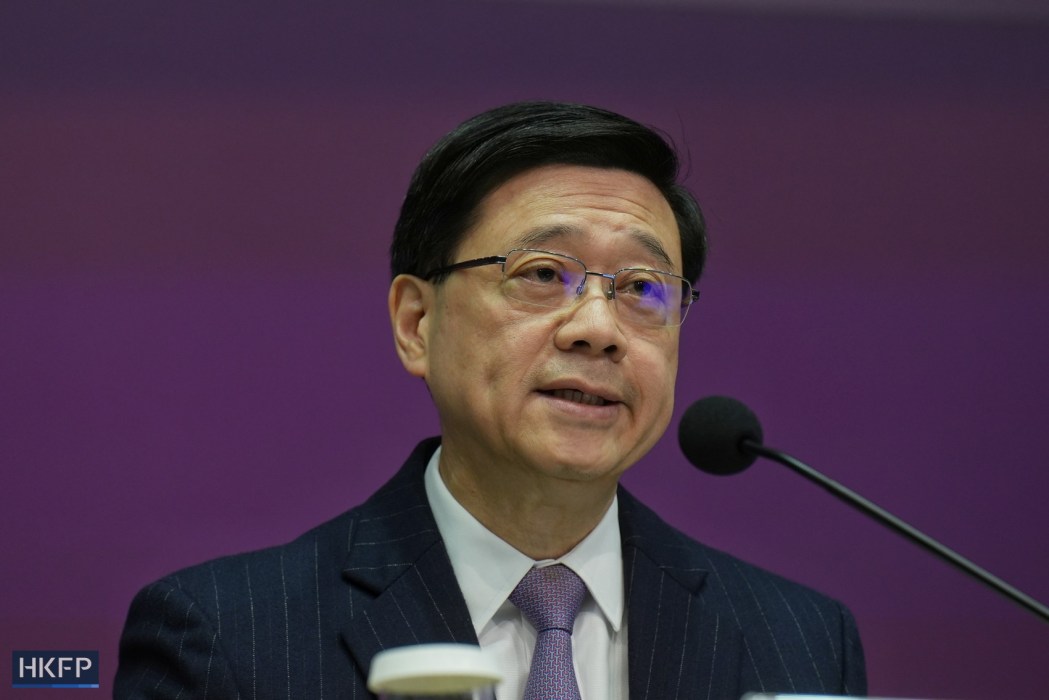A four-week consultation period for Hong Kong’s homegrown security law, known locally as Article 23, began on Tuesday, Chief Executive John Lee has announced.

Lee was joined by Secretary for Justice Paul Lam and Secretary for Security Chris Tang to announce details of the new security law’s consultation period at the Central Government Offices on Tuesday morning.
Article 23 of the city’s mini-constitution, the Basic Law, stipulates that Hong Kong shall enact its own laws to prohibit seven types of offences, including treason, espionage, and theft of state secrets.
See more: What is Article 23? The homegrown security law is back in the spotlight
“The legislation of Article 23 is necessary and must be done, and it should be done as soon as possible. This is the constitutional responsibility of Hong Kong, which has remained unfinished even after more than 20 years since Hong Kong returned to the motherland,” John Lee said in Cantonese.
The public consultation period will last until February 28.
Lee said that protests in 2019 had been “Hong Kong version of a colour revolution,” and had highlighted the need to safeguard national security.
He added that many countries had established a variety of laws to safeguard their security.
“The US has at least 21 laws [linked to national security], the UK has at least 14 laws, Canada at least 9 laws, Singapore at least six, Australia at least four laws, and New Zealand at least two laws, ” Lee said.
According to a statement issued by the Security Bureau on Tuesday: “It is proposed in the consultation paper that a new Safeguarding National Security Ordinance be enacted to comprehensively address the national security risks at present and those that may emerge in the future.”

During a failed attempt to legislate Article 23 two decades ago, the consultation period for the draft bill lasted for three months.
Asked why the consultation period this year was just four weeks, Lee said it was an “appropriate” time period.
“Our consultation paper is very thorough, it elaborates on national security risks outlined in other countries’ relevant laws, therefore the public will be able to understand it quickly. The community has reached a consensus on the legislation of Article 23. We should establish the law as soon as possible, ” Lee said in Cantonese.
He later added: “This is a law that tells people not to attack us, this is in a way a defensive law.”

The consultation document laid out risks to national security, the necessity of legislation, and the legal principles behind Article 23, as well as providing recommendations for defining offenses under the proposed legislation.
Five main areas seen as endangering national security were focused on: treason; “insurrection, incitement to mutiny and disaffection, and acts with seditious intention”; theft of state secrets and espionage; sabotage; and “external interference.”
Most of the recommendations aimed to improve existing laws, Tang said, and there are also suggestions for introducing new offences.
What is Article 23?
Article 23 stands alone from the Beijing-imposed national security law, which was passed in June 2020 following months-long pro-democracy protests and unrest, and criminalised secession, subversion, foreign collusion and terrorism.
A previous attempt to legislate Article 23 in 2003 was shelved following a protest attended by an estimated 500,000.

But Article 23 resurfaced on authorities’ agenda after the enactment of the national security law, with officials saying the homegrown security law would plug gaps in the Beijing-imposed legislation when it came to safeguarding national security.
A public consultation period was meant to begin in 2021 but officials said it was stalled by the Covid-19 pandemic.
During his Policy Address last October, Lee vowed to complete the legislation for Article 23 this year, describing it as a “constitutional responsibility.”
Special teams will be established during the legislative process – one to promote Article 23 to the business sector and the international community and another to rebut criticism of the legislation by “hostile forces” – Lee told lawmakers last week.
Unlike in 2003 when the city’s legal professionals voiced opposition, Victor Dawes, the chairperson of the Hong Kong Bar Association, said last week during the opening of the legal year that the legislation of Article 23 must be “transparent and thorough” to refute claims that the government does not listen to the public.
Support HKFP | Policies & Ethics | Error/typo? | Contact Us | Newsletter | Transparency & Annual Report | Apps
Help safeguard press freedom & keep HKFP free for all readers by supporting our team

























